Mechanics all know how important regular oil changes are to the longevity and reliability of an engine. But why is there so much consumer confusion surrounding the frequency of oil changes? This article will discuss Nissan’s official stance with respect to oil changes, as well as why it is important to refer to the owner’s manual or service manual for oil change interval recommendations.
For such a fundamental part of vehicle maintenance, there is much more confusion surrounding the humble oil change than any other aspect of car repairs. We as mechanics know how important the regular oil change is, but do we realize how much research and development goes into the service interval recommendation?
This article will explore the repeating question of “Why†we change oil. It will give Nissan technicians the confidence to best respond to a common customer question that ultimately has no single answer.
The purpose and science of modern engine oil
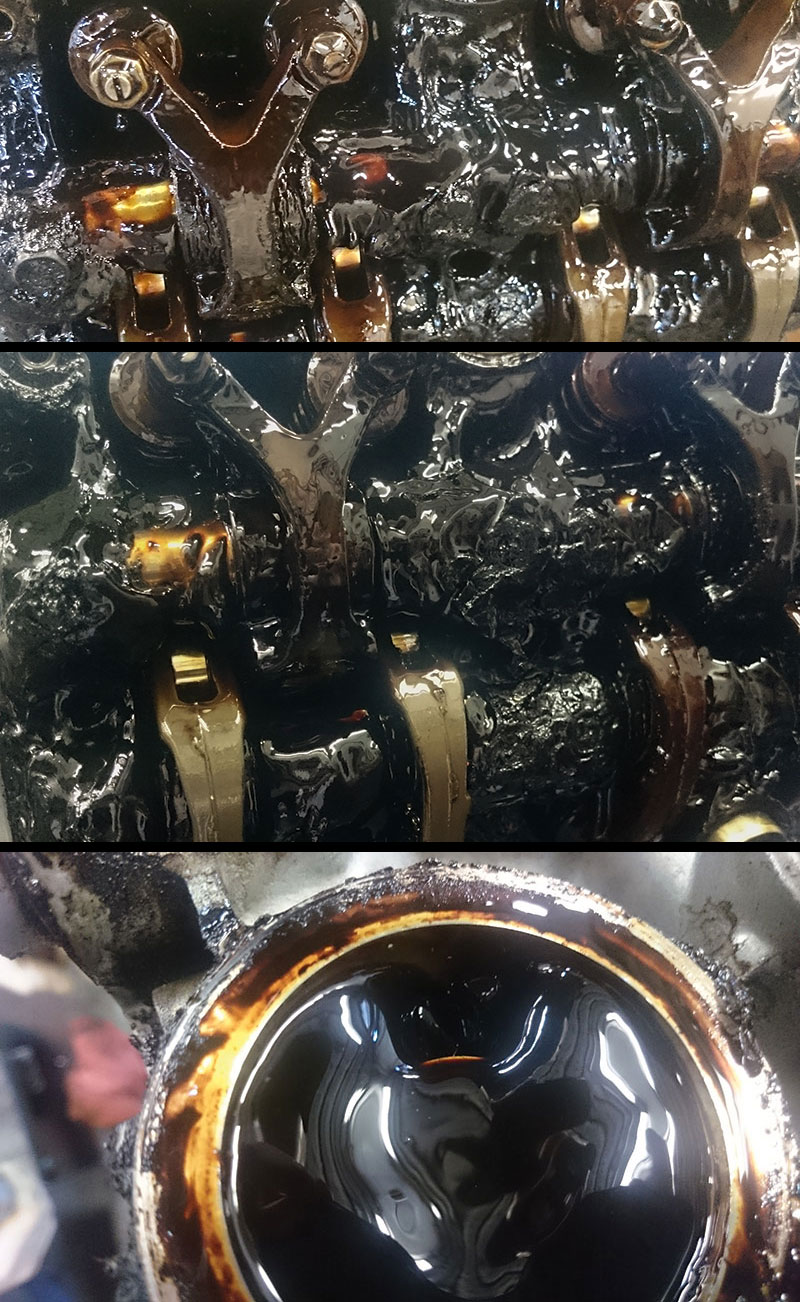
Free oil change with every engine replacement! Infrequent driving coupled with a coolant leak from the cylinder head gasket resulted in this oil gelling.
Let’s start at square one. The primary role of engine oil is to reduce engine wear caused by heat. Heat is generated from friction between every moving internal engine component, and from the combustion events. The secondary role of engine oil is to resist its own degradation over its service life so as to best perform its primary duty.
In order to appreciate the research and testing Nissan performs on its vehicles, we should understand what science goes behind engine oil. To reduce heat from friction, engine oil functions as a lubricant. A less obvious statement would be that engine oil provides hydrodynamic lubrication and boundary lubrication.
Hydrodynamic lubrication is ideal because the lubricated surfaces are completely separated by flowing oil, and only a little heat is generated from internal friction of the oil itself. Boundary lubrication is a last resort for when the microscopic irregularities of the two surfaces come into contact. Their contact creates more heat from friction, and also results in material wear as the asperities (the peaks of the irregularities) grind together and become suspended in the engine oil.
Nissan engineers determine the point engine oil change intervals need to be established. Nissan also determines the correct viscosity for their engines. Viscosity is the measurement of a liquid’s resistance to flow and its ability to support a load. If the oil viscosity is too high, it will not flow easily between the two lubricated engine parts causing drag – literally the same concept as air resistance. This wastes power and efficiency. If the oil viscosity is too low, the oil film cannot bear the load between the two forces, and the two lubricated engine parts will come into contact, causing wear.
Viscosity is affected by pressure and will shear under high stress. A simplified way to visualize shearing is to smudge a drop of water on the table. The single drop shears into many smaller droplets, and now the table is dry between them. When a rocker arm presses on a valve shim, the oil will be squeezed and some molecules will shear. When the shearing force stops, the sheared molecules may not return to the oil chain. Over time, viscosity will decrease. Resistance to shearing is a characteristic of oil chemistry.
Viscosity is temperature dependent. At lower temperatures, the viscosity is higher. Less flow means less oil film coverage, and therefore an increased amount of reliance on boundary lubrication.
Furthermore, heat will transfer from the lubricated surfaces into the engine oil as it makes contact. Nissan engineers have determined with rigorous testing the best way for their recommended oil to flow and for heat to be exchanged.
Therefore, without the correct viscosity, the engine oil will not flow as intended to the needed components, nor will it support the intended load forces between the lubricated components. This is why the single most important thing for engine longevity is to match the Nissan-recommended oil grade.
Why does oil viscosity matter? Because it does most of the protection work.
The official Nissan oil change interval
Understanding the chemistry behind engine oil illuminates the importance of the oil and the role regular service intervals perform. Nissan has tested their branded oils with their engines for millions of miles, monitoring the rate of deterioration with scientific rigor and professional testing. The official intervals are published with these considerations in mind.
It is important to check the official oil change interval for every Nissan vehicle you work on. Also, you should ask the customer a few questions about their driving habits to determine the severity of the vehicle’s usage. Ultimately, there is no one simple interval recommendation for every single customer. The customer can find information about maintenance for their car in the owner’s manual.
Nissan service manual or owner’s manual Maintenance section includes information about how to recommend maintenance as well as how to perform it. You gain access to each manual with a subscription to www.nissan-techinfo.com. As a repair tech, it will be your responsibility to research the official Nissan recommendations. There will be a table to indicate recommended mileage and time frame for each relevant service item. You will also discover important information about specific fluid requirements, capacities, and methods to determine their condition.
Why oil should be changed
Pay attention to customers who drive less than average. Check the service manual or owner’s manual for recommended timetables for oil changes, typically every six months. This is true even for vehicles that have not traveled many miles. Here’s why:
Moisture build-up from infrequent driving can create gelling from emulsification (think salad dressing). Cars that aren’t driven for sufficient duration at full operational temperature means that water inside the crankcase is never vaporized and vented. Plus, without heat expansion, piston rings never seal perfectly, allowing ambient dust particles and fuel to blow-by and contaminate the oil.
Fuel contamination is a serious consideration. After about 1500 miles in an average engine, there may be as much as 3 percent fuel in the oil! Infrequently driven cars will have richer mixtures and higher moisture content, resulting in rapid oil degradation despite low mileage.
Use Nissan filters because they fit properly, seal and won’t leak. They also have high quality filtration capability, and an anti-drainback valve to provide oil pressure faster during startup.
Choosing the correct oil: The API Donut
Nissan service manual or owners’ manual refer to the required oil using a registered mark from the American Petroleum Institute (API).
The engine oil industry is more strictly regulated than aftermarket parts suppliers. Engine oils that pass controlled testing can display the API’s “donut†certification stamp.
All genuine Nissan motor oils are API certified. However, not all API certified oils can work in all Nissan engines. This is because not all API certified grades are equal. Currently, oils with the API “SN†certification are the highest standard. Even if the viscosity is correct, an oil that is API “SM†should not be used in a vehicle that calls for API “SN.â€
Making things a bit more confusing, the designation “Energy Conserving†is not the same as “Resource Conserving.†Resource Conserving oils are a special sub-type of API-SN oils that have been engineered with less of the additives that shorten the lifespan of catalytic converters and oxygen sensors. Failure to use Resource Conserving oils in cars that call for them may shorten the lifespan of expensive emissions control components.
The best interest of the driver
Consumer advocate groups and some state governments have enacted measures to try to protect motorists from predatory oil change recommendations. The spirit of these laws is to prevent a quick lube joint or similar unscrupulous shop from unnecessarily changing oil before it nears the end of service life. This wastes oil resources, risks spillage into the environment, and costs customers money. The federal government has published that as little as 50-100 ppm concentration of oil can cause a water treatment process to fail, and that 1 gallon of oil can contaminate 1,000,000 gallons of fresh water.
With all of this in mind, it’s clear that Nissan engineers know what’s best for their cars and their engines based on how the vehicle is used. For this reason, motorists and technicians alike should refer to the car’s service manual or owner’s manual for appropriate oil change intervals, with special attention paid to how the vehicle is used.
By following the Nissan official intervals, you will protect your customers’ investment as well as the environment.

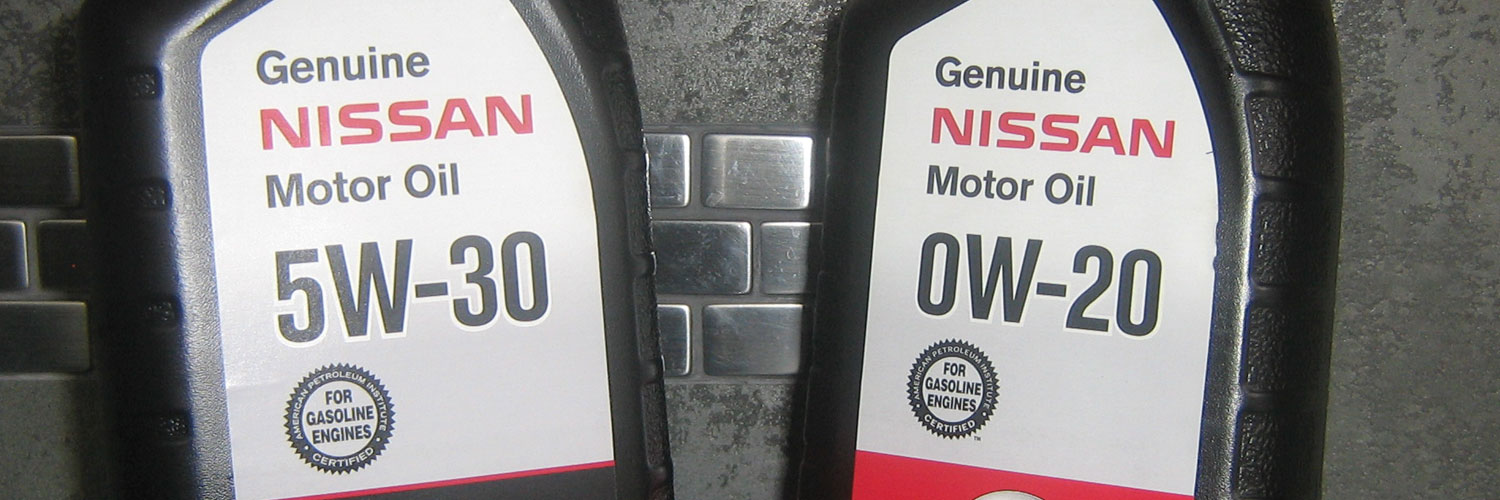


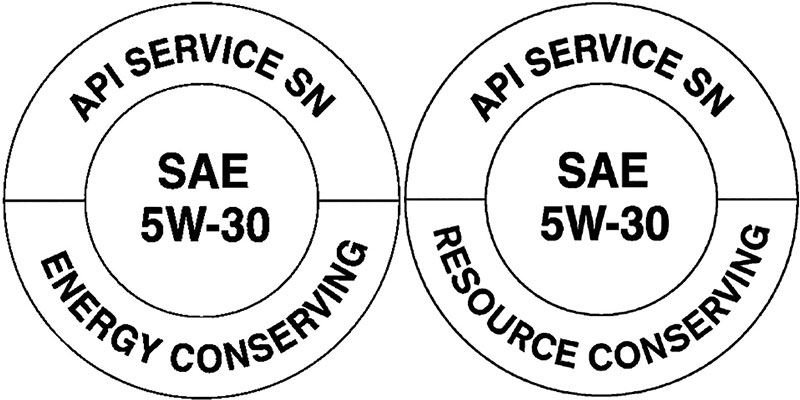

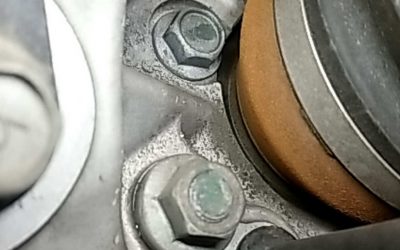
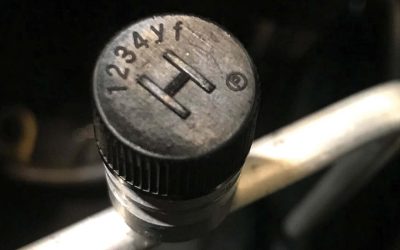
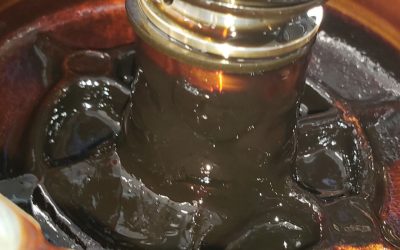
0 Comments